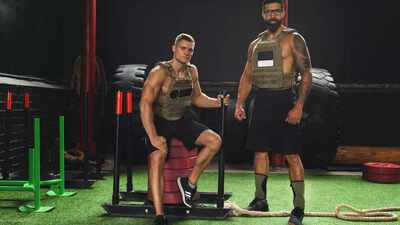ARTICLE AD BOX

As more and more people become conscious about health and fitness, we’re seeing a wave of creative strategies to make working out more effective, even during our busy schedule through everyday movement.
One such method that’s picking up pace is the use of weighted vests.While these vests have been around for more than a decade—once associated primarily with military drills and CrossFit athletes—are now trending among mainstream fitness circles, including middle-aged women, celebrities like Jessica Alba, and even news anchors like Katie Couric.But how effective are they, really? Can strapping on a weighted vest help you burn more calories? In this article, we break down what weighted vests are, how they work, their pros and cons, and what science says about their benefits.
What is a weighted vest and how does it work?
A weighted vest is a wearable garment that distributes weight evenly around your torso, often ranging from 5% to 30% of your body weight. The idea is simple: by adding resistance, your body works harder—even for the same movement—resulting in increased calorie burn and muscular engagement.

Source: Getty Image
Dave Looney, who is an exercise physiologist at CoachMePlus and has studied weighted vests for the U.S. Army, explains to the Wall Street Journal that wearing a vest that is 10% of your body weight can help you burn around 8.5% more calories than usual.
And it only goes up from there—a vest weighing 20% or 30% of your body weight can push calorie burn to 19.7% and 32.2% respectively.But it’s not just about calories. Looney adds that weighted vests also challenge stabilizing muscles like your back, shoulders, abs, and legs, which can help improve core strength and posture over time.
The real benefits (and a few caveats)
Like with any new trend, don't expect magic when using these vests, however continued usage can be really effective.
They are especially beneficial during cardiovascular workouts like walking, hiking, or running. Just keep the weight to about 10-20% of your body weight to avoid limiting your range of motion or overstraining your joints.Troy Purdom, assistant professor of kinesiology at North Carolina A&T State University, has found that warming up with a weighted vest can enhance performance. In one study, recreational runners who wore a 10% body-weight vest for 20 minutes before a 5K shaved more than 15 seconds off their race time.

Source: Getty Image
Weighted vests are also being explored for benefits beyond cardio. For example, a study by Snow et al. followed 18 postmenopausal women over the course of 5 years. Those in the intervention group used a weighted vest during jump-based exercises and showed better hip bone mineral density (BMD) outcomes than the control group. However, researchers can not establish if the improvement in the subjects was a result of the weighted vest alone or the combination of vest and jumping exercises.That being said, it is important to note that weighted vests are not FDA-approved medical treatments. Consult a doctor first if you’re considering them for osteoporosis or low bone density. FDA-cleared options like Osteoboost exist for such conditions, backed by more robust clinical trials.
Worth the weight?
So, how many more calories do you burn with a weighted vest? If you’re wearing a vest equal to 10% of your body weight, you’re looking at 8-9% more calorie burn during your workout.
Bump that to 20-30%, and you could nearly double or triple that benefit—but only if it doesn’t compromise your movement or safety.In conclusion, these not so fashionable weighted vests can be a smart addition to your fitness routine if you want to elevate daily walks or workouts without hitting the weights. However, it is advised to be mindful of one's limits. Always prioritize form over adding weights.



.png)
.png)
.png)
















 4 hours ago
5
4 hours ago
5









 English (US) ·
English (US) ·